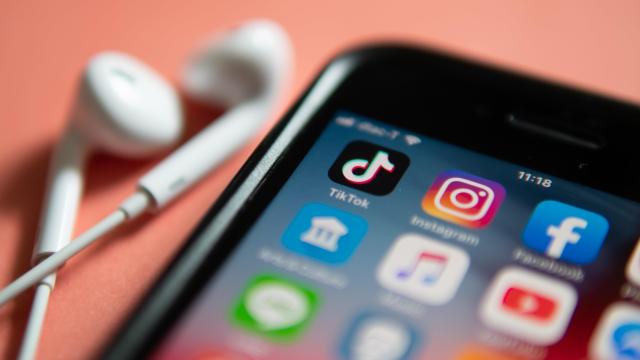For Facebook and its parent company Meta, “pride” and “envy” aren’t so much mortal sins as they are a modus operandi. The company’s obsession with being at the top of the social media ladder could also propagate more harmful content for users.
The Verge released a detailed report Wednesday that proves Facebook is well on its way to becoming more like TikTok, which is owned by China-based ByteDance. According to a memo leaked to The Verge that’s included in their article, Facebook’s new “Discovery Engine” will algorithmically share with users much more content from outside the accounts and pages they follow.
This is a hard right turn away from the platform’s attempts to focus on content shared by friends and family. In its memo, Facebook said the face of social media is changing, that they need engines “that help people find and enjoy interesting content regardless of whether it was produced by someone you’re connected to or not.” The company’s document states that they want to focus on “connecting people,” and the new feature will help people connect via shared interests or identity.
The main app will reportedly include Stories and Reels at the top of the page while showing you curated discovered content underneath. Groups will be renamed to “Communities” and the page will focus more on short-video content that plays to the viral format that incentivizes younger users to use the platform.
These proposed changes will not only completely reinvent the platform’s feed systems that were initially changed in 2018, it will also mean Messenger will reintegrate with Facebook and appear in the top right portion of the app. This is to emphasise “messaging-based sharing” of content appearing on the new feed. The two apps were originally separated in 2014 in order to make sending messages faster, as founder Mark Zuckerberg later claimed that same year.
A big part of this move is Reels, which was already integrated on Meta-owned platforms Facebook and Instagram to introduce more short-form video into people’s feeds. The platform has been throwing money at content creators they hope will tear people away from their TikTok feeds, but with Facebook’s current format, the company is realising it can never be as addictive as its main social competitor. In the memo’s FAQ, one of their previous priorities of “reducing negative experiences” has been replaced with things like “make reels successful.”
Facebook has had a hard time navigating its algorithms
So what does this reinvention mean for Facebook’s algorithm? Zuckerberg announced changes back in 2018 that he wanted the platform to go back to friends and family members sharing awkward vacation photos, but that seems to have largely failed.
It’s rare for those at the top of Facebook’s food chain to talk to the press, but Tom Alison, the head of Facebook, told The Verge that those attempts at rounding off Facebook’s rough parts were eclipsed by Stories as the main ways individuals interacted in any positive way.
“A lot of where we’re going with Facebook is trying to bring you the best content that’s going to really cater to your interests, but then making it super easy to share that and discuss and connect with other people in your network over that,” Alison told The Verge.
It’s not like the feed has been a positive influence. The leaked Facebook Papers already demonstrated how the company’s systems “ranked” content in users’ news feeds in order to maximise the amount of time spent on the platform, no matter employees’ concerns that it damaged relationships or helped spread disinformation. The company has stopped recommending political groups to users based on preferences, and Alison said their intent is to have a “cleaner and easier-to-use experience.”
But Facebook’s renewed focus on AI-based algorithms for people’s feeds seems like a step backwards when its main inspiration already has a problem filtering harmful content. TikTok’s moderators have reportedly been through hell trying to shut down disgusting, violent content. While the app isn’t alone in spreading falsities, its algorithm and “For You” page reliably display disinformation thanks to its focus on showing user’s content based on preferences.
Facebook’s need to stay relevant
Facebook has been gunning for TikTok more and more as the platform has come to prominence. TikTok has seen its ad revenue go through the roof while becoming one of the most popular platforms in the world. The company has gone so far as to allegedly hire a GOP-linked consulting firm to smear their competitor through negative articles and op-eds.
The short-form video format has proved to be effective, at least according to user numbers. Google announced Wednesday that YouTube Shorts, meant to imitate TikTok’s quick-fire style, has grown from 1 billion monthly users to over 1.5 billion in a few months, beating that of TikTok’s 1 billion shown last September. It’s not like Meta is about to run out of money any time soon, but the lack of growth this past quarter has only sharpened the company’s need to do something different.
And in the meantime, Facebook is afraid of its future prospects if it continues like it has. Like many tech companies, Facebook has not had a good start to the year, but for the first time in its history, the company lost around a million users. Meta is trying to fund its metaverse projects, but the current downturn has made investors lukewarm on pitching in.
Static news is out, and short-form video is in, apparently. A recent report said Facebook is considering ending its contracts with the biggest news outlets to make more money from TikTok-esque videos.
In the race to capitalise on every minute of users’ time, every social platform wants to be everything for everyone. TikTok wants to be more like Twitch. Spotify wants to be more like TikTok. Instagram wants to highlight novel, YouTube-ish content. On and on, until the great big tech homunculus is too bloated for anyone’s use.
